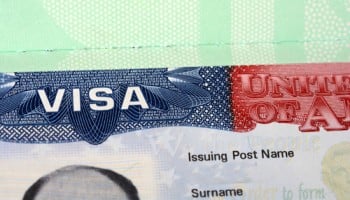Second federal judge partly blocks Trump's third travel ban

Shutterstock.com.
A federal judge in Maryland has become the second federal judge to grant a nationwide injunction blocking part of President Donald Trump’s third travel ban.
U.S. District Judge Theodore Chuang said the travel ban likely violates the establishment clause as well as a statutory ban on discrimination based on nationality in the Immigration and Nationality Act. His opinion (PDF) was released early Wednesday.
Chuang’s nationwide injunction prevents the government from applying the travel ban to people from six Muslim-majority countries who have a bona fide relationship with an entity or individual in the United States. The six nations are Chad, Iran, Libya, Somalia, Syria and Yemen.
Chuang’s decision follows a ruling on Tuesday by U.S. District Judge Derrick Watson, who said the third travel ban “plainly discriminates based on nationality” and issued a nationwide order blocking the restrictions on travel from the six Muslim-majority countries. Watson’s decision was based on statutory violations.
Neither judge blocked travel from two other nations on the latest list, North Korea and Venezuela. The travel ban for the South American country only applies to some government officials and their families. The travel restrictions had varied based on the country.
The American Civil Liberties Union was among several organizations that sought an injunction in the Maryland case. Omar Jadwat, director of the ACLU’s Immigrants’ Rights Project, notes in an email to the ABA Journal that the upshot of the injunctions by the two judges is that the government cannot apply its travel ban to anyone from the six countries. The third travel ban had been set to take effect Wednesday.
Jadwat also commented in a press release. “Like the two versions before it, President Trump’s latest travel ban is still a Muslim ban at its core,” he said. “And like the two before it, this one is going down to defeat in the courts. Religious discrimination with window dressing is still unconstitutional.”
Though Chuang’s injunction was less far reaching than Watson’s, it was in some ways “more cutting to Trump” because its findings were based on the president’s own words, the Washington Post reports.
Chuang’s decision notes Trump’s online statement during the campaign calling for “a total and complete shutdown of Muslims entering the United States” and later statements saying he would fulfill the pledge by focusing on territories rather than religion.
“The ‘initial’ announcement of the Muslim ban, offered repeatedly and explicitly through President Trump’s own statements, forcefully and persuasively expressed his purpose in unequivocal terms,” Chuang wrote.
The latest travel ban “doubles down” by making the ban on travel from the six Muslim-majority countries indefinite rather than temporary, Chuang said.
Typo corrected at 12:30 p.m.
Write a letter to the editor, share a story tip or update, or report an error.


